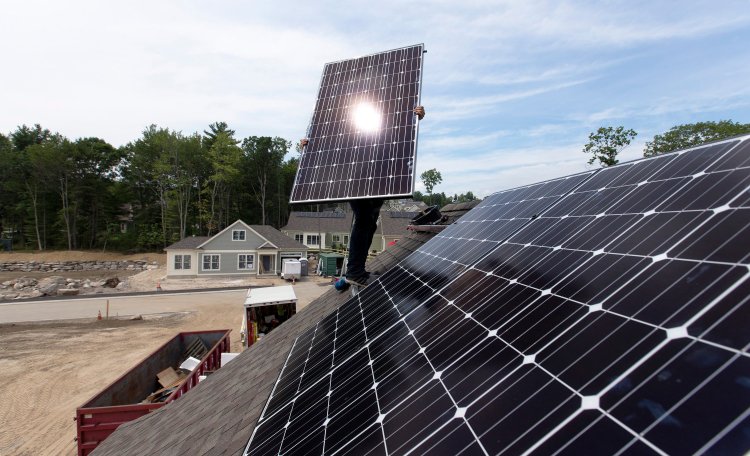
A proposal to cut billions in federal grants designed to help low-income communities install solar energy projects could claw back over $60 million awarded to Maine and impede the state’s clean energy transition.
The Environmental Protection Agency is reportedly moving to terminate the $7 billion “Solar for All” grant program and is already drafting termination letters to 60 recipients, including the state of Maine, the New York Times reported. That report, and others since, cited unnamed sources familiar with the talks.
But the EPA has not formally announced any terminations and has not yet made a final decision, the agency said in an email to the Press Herald Wednesday.
“With the passage of the One Big Beautiful Bill, EPA is working to ensure Congressional intent is fully implemented in accordance with the law,” a spokesperson said in a written statement, referencing the informal name of the federal budget reconciliation bill passed weeks ago.
Maine submitted its application for the grant in 2023 and was awarded $62 million last year.
The Governor’s Energy Office plans to use that money to help expand solar energy to thousands of low-income households by incentivizing residential solar panels and storage systems, providing support to cooperatively owned solar, and creating a new community solar and energy storage program.
It would also help fund workforce training for Mainers looking to build skills in electrical work, construction and other building trades. Maine currently faces a shortage of licensed electricians.
As of Wednesday, the office had not gotten any word from the EPA about the terminations and was still able to withdraw federal funds, spokesperson Afton Vigue said in an email.
Dan Burgess, director of the energy office, said the reports of the termination “are alarming and raise serious legal questions” and argued any such cuts would hurt vulnerable Mainers the most.
“Ending this award would deprive Maine people of access to affordable solar, energy storage and job training that supports the electricians, installers and construction workers we need to help meet Maine’s energy and economic needs today and in the future,” Burgess said in a written statement.
The proposed termination comes as Maine seeks to procure 100% of the state’s retail electricity from clean and renewable sources by 2040. Meanwhile, electricity demand is expected to more than double by 2050.
REPRESENTATIVES RESPOND
In a letter to EPA Administrator Lee Zeldin, Rep. Chellie Pingree, D-1st District, called the proposal illegal and “unconscionable.”
“Not only would this action undermine congressional intent, it would also threaten investments that will lower energy costs for American families across the country,” Pingree wrote in the letter, dated Wednesday.
She noted that Maine, like dozens of other states, has already begun planning its program and budgeting its grant allotment. Other recipients include tribal governments and nonprofits, the EPA announced last year.
“Pulling this funding after so much effort has been put into the development of this program undermines economic opportunity and public trust,” Pingree wrote. “Let the EPA do what it has been empowered to do: help Americans save money, breathe cleaner air and build a more secure energy future.”
The agency told the Press Herald it is reviewing Pingree’s letter and “will respond through the appropriate channels.”
A spokesperson said Rep. Jared Golden, D-2nd District, supports an “all-of-the-above approach to energy” and bringing down costs for Maine households. He noted that the solar program was authorized by Congress in 2022 as part of the Inflation Reduction Act.
“And all-of-the-above includes solar,” spokesperson Patrick White said in a Wednesday email. “These grants became federal statute when the Inflation Reduction Act was signed into law, and if the administration does terminate them, the Congressman will follow closely as the debate likely plays out in the courts — the same place where previous challenges to congressionally-approved funding have played out this year.”
The Trump administration has targeted several other clean energy programs — such as tax credits for home solar — included in the act, which was a hallmark of former President Joe Biden’s tenure.
A spokesperson for Sen. Angus King, an independent from Maine who caucuses with Democrats, declined to comment on the reports and said the office was still determining the facts.
Republican Sen. Susan Collins said “the abrupt termination of this program would be unfortunate news,” but said that possibility illustrates the dangers inherent in including a grant program in a “completely partisan bill.”
“Not one Republican voted for the Inflation Reduction Act that included this grant program,” Collins said in a written statement. “While it is no surprise now that control of the White House has changed that the new administration would consider terminating this IRA program, my staff has asked the EPA for additional information.”
Editor’s note: This story was updated on Aug. 7 to correct Sen. Angus King’s party affiliation.
